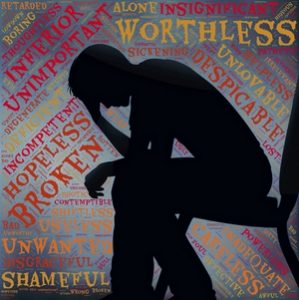
Why I also like to work with tarot cards
1. July 2017
Wie Hypnose im Rettungsdienst Unfallopfern helfen kann
6. February 2018How does it work that hypnosis helps so well with anxiety and depression? What does hypnotherapy have that most other therapies do not?

Well, Hypnosis “chats” with this guard a little bit and keeps him busy. And at the moment when the watcher is busy, it is possible to examine your subconscious.
 So what most modern forms of therapy lack is the ability to silence your negative inner dialogues for a long enough period of time.
So what most modern forms of therapy lack is the ability to silence your negative inner dialogues for a long enough period of time.
- gets problems at work,
- relationships are strained or even break down as a result,
- additional health problems arise, such as stress, gastric ulcer, irritable bowel syndrome, etc.
- a state of constant fear (also: fear of fear!) and dissatisfaction, up to depression, sets in.
Depression is indeed a common sequelae of anxiety disorders, but it comes in a wide variety of forms and manifestations. According to the German Federal Ministry of Health, depressive disorders include “among the most common and most underestimated diseases in terms of severity. It is estimated that around 350 million people worldwide now suffer from depression. By 2020, depression or affective disorders will be the second most common disease worldwide, according to the World Health Organization.”.
A comparative international study conducted in 2011 found that in higher-income countries, approximately 14.6% of the population develops depression at some point in their lives. For Germany, that’s almost 12 million people.
And even though depression is a common consequence of anxiety disorders, there is still a high proportion of people who suffer from depression but not from anxiety disorders.
So we have about 12 million people who suffer from an anxiety disorder at some point.
And we have another 12 million people who suffer from depression.
If we assume that there are also people who suffer from both disorders, we can still assume that at least 15 million people have either an anxiety disorder, depression, or both.
This means that, conservatively calculated, every 5. or 6. person you meet suffers from anxiety or depression.
And since we have not yet factored out children in this, it is probably actually any 3. or 4. person you meet who is going through life with anxiety or depression..

So these alarming numbers show that there are an incredible number of people seeking help.
The good news here is that hypnosis actually has the capabilities to help people with anxiety and depression.
Unfortunately, this is still far too little known or recognized. Many patients come to me only as a last resort, only when they have “gone through” everything else, many are willing to “give hypnosis a try”.
Why is that?
One reason may be that many people know too little about hypnosis. And of course, there is also a lot of completely false information out there, especially the area of show hypnosis provides a completely distorted picture of what actually happens in hypnotherapy.
Another reason is that most people only know hypnosis as a method for quitting smoking or losing weight. Many people (including doctors and psychotherapists) do not realize that hypnosis can be used to treat a wide range of problems .
The first reflex of the primary care physician confronted with an anxiety disorder or depression is usually to send the patient to a psychologist or psychotherapist. This is understandable, because they are trained for exactly these topics. Only unfortunately, this training usually includes less or nothing about hypnosis, often the corresponding practices are hopelessly overloaded: Waiting times of 6 to 12 months are not uncommon, often there is only time for a short conversation and the prescription of psychotropic drugs. Which may bring short-term relief. But of course they cannot solve the problem, let alone cure the disease.
Various studies have shown that hypnosis is highly effective in treating anxiety and depression. And initial results are often seen in a fraction of the time required by conventional forms of therapy.
Another advantage is, of course, that hypnotherapy is 100% drug-free and therefore has no side effects. Which is good news, considering how habitually the prescription pad is often pulled out in psychotherapy practice.
Psychotropic drugs can of course be very helpful in bad cases – but they are not a permanent solution and it is important that people know that there are also alternatives to this.

Hypnotherapy is a drug-free and side-effect-free therapy method that is very helpful in the treatment of fears and phobias. The number of sessions required is significantly lower than in conventional psychotherapy, and initial improvements often occur after just a few sessions.
Any questions?

If you are interested in a consultation or therapy, then you can
here directly book your personal desired appointment
(reminder: in the meantime I work online via Zoom – so no travel is necessary and appointments towards evening or on Saturdays are often possible)
If you have any questions, please feel free to call me (+49 151 507 122 23) or write an eMail (info@katharinahille.de).


